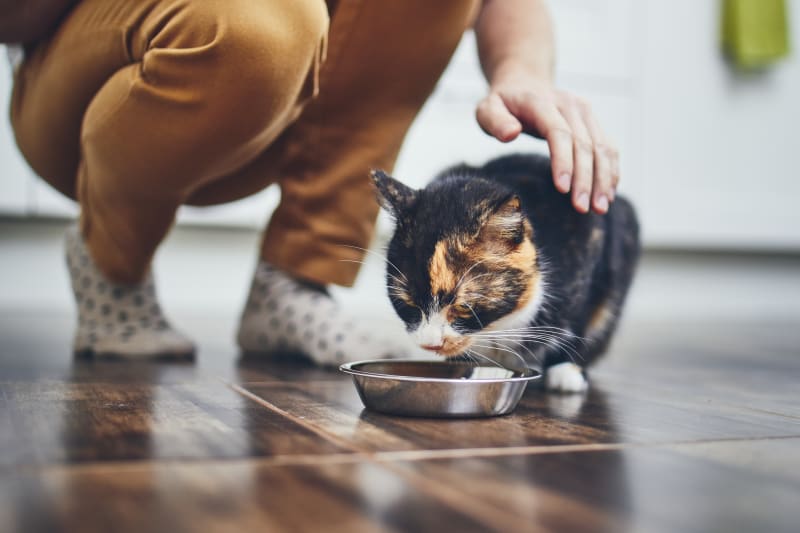Does dry food cause kidney failure in cats? | Baltimore Vet

You want to ensure your cat gets high nutritional value from its diet. If you’ve done your research and wondered if dry food causes kidney failure in cats, our Baltimore vets have some answers for you. Plus, we explain the causes of kidney failure.
cats & diet
Deciding what food to give your cat requires a delicate balance. after all, you have to consider the nutritional value, your cat’s picky (and potentially game-changing) palate, and your budget. there is also another key choice: wet food or dry food? which is best for your kitty’s long-term health and nutrition?
In this post, we address the questions surrounding dry cat food and whether it causes kidney problems. We list the real causes of kidney failure in cats and recommend the best types of food for a cat with kidney disease.
Does dry cat food cause kidney failure in cats?
You may find that your cat prefers one type of food over the other, whether she reaches for wet food from a bag or her favorite dry kibble.
If you’re a knowledgeable kitty parent, you may have read various tips in pet publications or sympathized with other cat owners about their four-legged friends’ diets and learned that the Dry food can affect kidney health or be bad for your cat’s teeth or urinary tract.
however, the nutritional content of cat food is much more important than whether it is dry or wet.
fats, proteins & carbs… oh my god
Cats are naturally carnivorous, which means that fatty acids and meaty proteins are essential to their diet. too many carbohydrates can cause diabetes and obesity. while your kitty will need a small amount of carbohydrates, a diet that is too high can cause health problems.
That said, many dry foods contain rice, cornmeal, and grains to help your cat process the kibble, which adds up to more carbs (wet foods, on the other hand, contain fewer of these). You’ll even find plant protein instead of meat in some cat foods, which isn’t ideal for your meat-loving cat.
our feline friends need foods high in protein and animal fat and low in carbohydrates. While the amount of carbs in some dry foods is acceptable (and there are few or no plant or grain products), they often have special labels.
Just like you do when shopping for yourself, read the ingredients list on your cat’s food and leave items with ingredients like peas, beans, corn, potatoes, or rice on the shelf.
The key is to be aware of the nutrients in your pet’s food and make sure they match your four-legged friend’s dietary requirements.
can dehydration cause kidney failure in cats?
Due to their low thirst drive (compared to other animals), cats typically drink little water during the day. although they may be dehydrated, they will not feel thirsty. therefore, our feline companions rely on food for water.
Wet food contains more water than dry food and is more similar to what kittens would eat naturally. extra moisture promotes better bladder and kidney health in cats, while prolonged dehydration can lead to urinary tract irritation and potentially lead to kidney disease.
Do you have a cat that prefers dry food? sprinkle a little water on food to encourage them to drink more. this way, they get the benefits of wet food without having to change food. For advice tailored to your cat’s circumstances, our vets can offer nutritional consulting services and develop a personalized dietary plan to meet your cat’s needs.
what causes kidney failure in cats?
There are actually two types of kidney failure in cats, and each differs in their causes.
acute renal failure
For cats with acute renal failure, their kidneys suddenly can’t work properly. This type of kidney failure occurs suddenly, over days or weeks. if diagnosed early, acute kidney failure can often be reversed.
It can occur in cats of any age and is usually caused by infection, organ failure, poisons, dehydration, urethral obstruction, and other triggers.
chronic renal failure
chronic kidney failure usually develops over several months or even years and is therefore more gradual in nature. This type of kidney failure is usually caused by autoimmune diseases, genetics, or kidney cysts.
This type of kidney failure can lead to total kidney failure, which causes the kidneys to gradually stop working as they lose the ability to filter toxins from the blood.
note: The advice provided in this publication is for informational purposes only and does not constitute medical advice regarding pets. For an accurate diagnosis of your pet’s condition, please make an appointment with your veterinarian.